As the worlds of data science and AI continue to expand, the demand for robust computing power is greater than ever.
Professionals and students alike need a powerful laptop that can handle intensive tasks like deep learning algorithms, machine learning tasks, data processing, and data analysis.
What notebooks should data scientists invest in?
In this article, I provide the right recommendation for your data science needs, whether you are a data scientist, a data analyst, or a student.
While I recommend some top picks, you might also want to explore my comprehensive guide on the best laptops for different uses, which includes laptops perfect for different demanding tasks.
Top 9 Laptops for Data Science in 2024
The market is full of options, but here, I present the 9 best laptops for data science in 2024.
1. Macbook Pro M2
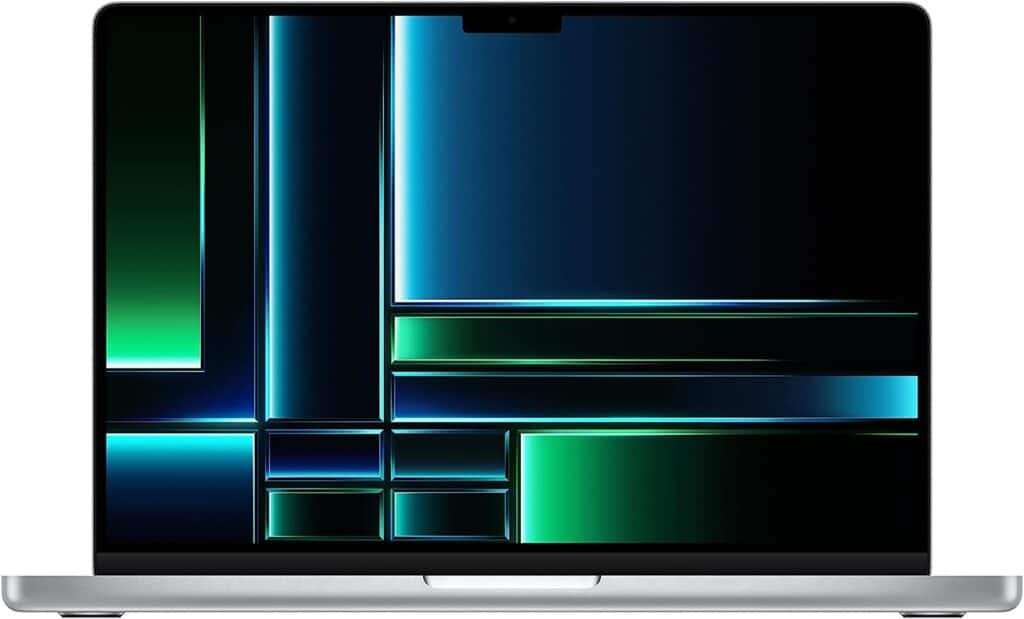
Many data scientists prefer the MacBook Pro with the M2 chip. Its high processing power makes it ideal for data science tasks like deep learning, machine learning, and data analysis.
With an operating system that’s reliable and robust, this laptop is also perfect for programming. Its ability to handle heavy data loads and run multiple data science tasks concurrently makes it a great choice for data scientists.
Technical Specifications:
- Processor: Apple M2 Chip
- Memory: Up to 64GB Unified Memory
- Storage: Up to 8TB SSD
- Display: Liquid Retina XDR display
- Graphics: Up to 32-core GPU
The MacBook Pro M2 boasts the innovative M2 chip that delivers breakthrough performance for your data science tasks. The processing power of this laptop is impressive, with its ability to handle multiple high-demand applications simultaneously without experiencing lag.
This laptop’s ability to process and analyze large data sets is unparalleled, making it a prime choice for data scientists.
The MacBook Pro M2 provides up to 64GB of unified memory and up to an 8TB SSD, ensuring smooth handling of data-intensive tasks. Its Liquid Retina XDR display provides an immersive visual experience for data visualization and analysis.
2. HP Envy 17T
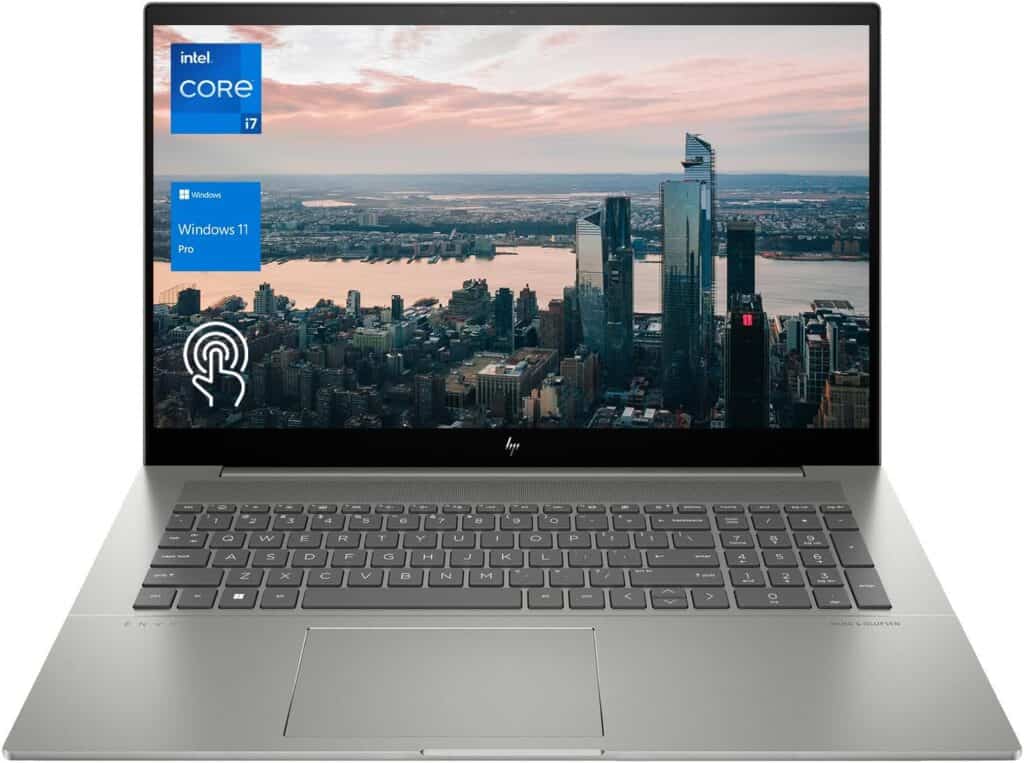
The HP Envy 17T is a powerful laptop that’s ideal for data science students and professionals. Its excellent specs offer the ability to handle data science projects efficiently.
It comes with an Intel Core i7 processor and an NVIDIA GeForce MX450, which are perfect for running data science programs and building data models. The 17.3″ diagonal FHD display helps with better data visualization, making it an excellent choice for data analysts.
Technical Specifications:
- Processor: Intel Core i7
- Memory: Up to 32GB DDR4
- Storage: Up to 2TB SSD
- Display: 17.3″ FHD
- Graphics: NVIDIA GeForce MX450
The HP Envy 17T’s processor offers high processing speeds, which are essential for running data science programs and algorithms. The NVIDIA GeForce MX450 graphics card allows for efficient processing and rendering of visual data, which is beneficial for data visualization.
The 17.3″ FHD display ensures a high-quality visualization workspace. With a solid 32GB of RAM and up to 2TB of SSD storage, it can easily handle large data sets, making it an excellent choice for data analysts and scientists.
3. Lenovo ThinkPad T15p
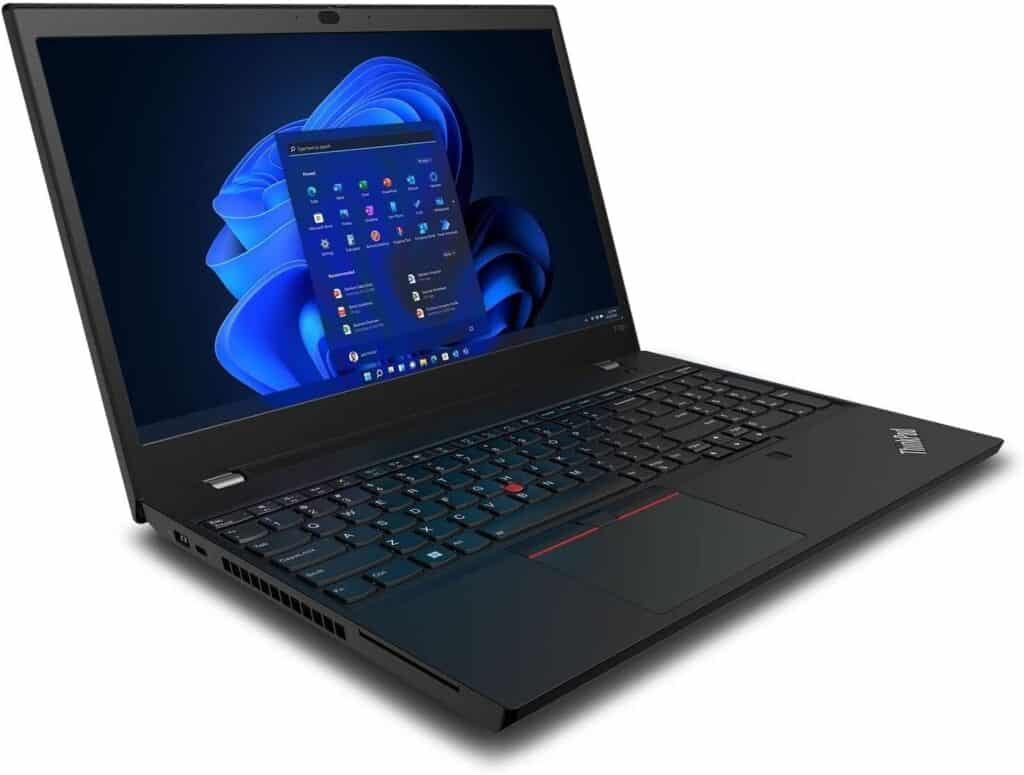
The Lenovo ThinkPad T15p is another superb laptop for data science. This machine comes with a powerful processor, good storage, and a great graphics card, making it capable of handling large data sets.
The ThinkPad T15p also features a comfortable keyboard, which is essential for programming and data entry. With a robust build and a good display, it’s a laptop designed to meet all your data science needs.
Technical Specifications:
- Processor: Intel Core i7
- Memory: Up to 64GB DDR4
- Storage: Up to 1TB SSD
- Display: 15.6″ FHD
- Graphics: NVIDIA GeForce GTX 1050
The Lenovo ThinkPad T15p is equipped with an Intel Core i7 processor, which enables it to handle intense computing tasks required in data science. Coupled with the NVIDIA GeForce GTX 1050 graphics card, this laptop can efficiently process visual data, making it a go-to choice for data visualization tasks.
It has robust memory and storage capacities of up to 64 GB DDR4 and 1 TB SSD, respectively. This feature allows the laptop to store and process large data sets with ease.
4. Dell G15
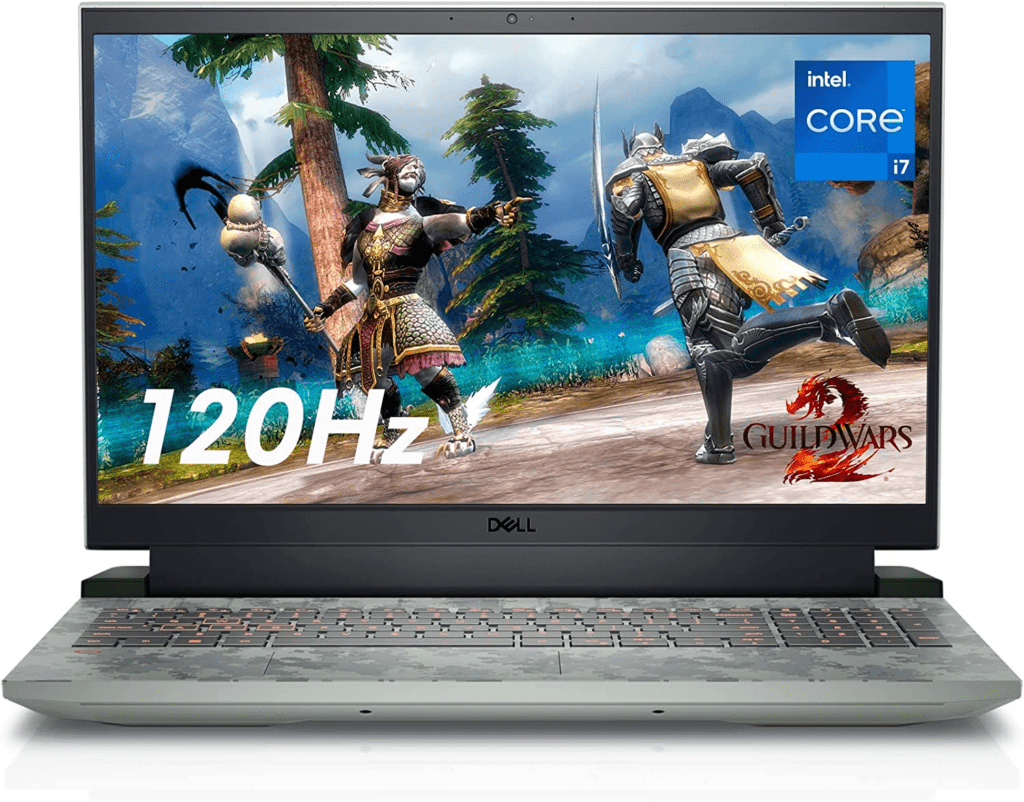
The Dell G15 is a gaming laptop that doubles up as a data science laptop. It’s equipped with a powerful processor and a superior graphics card, enabling it to process large data sets with ease.
The G15 has a solid build and offers a comfortable user experience, which is a plus for data scientists who spend long hours working on their laptops. This laptop is also excellent for tasks like deep learning and running complex machine learning algorithms.
Technical Specifications:
- Processor: 11th Generation Intel Core i7
- Memory: Up to 32GB DDR4
- Storage: Up to 1TB SSD
- Display: 15.6″ FHD
- Graphics: NVIDIA GeForce RTX 3050 Ti
The Dell G15 is a laptop that is also suitable for data science. Its 11th-Gen Intel Core i7 processor and NVIDIA GeForce RTX 3050 Ti graphics card allow for the smooth operation of heavy data processing tasks and advanced machine learning algorithms.
This laptop also comes with solid memory and storage capacity, providing ample room for large data sets and demanding applications. The FHD display ensures that data visualization is sharp and clear.
5. ASUS ROG Strix G17
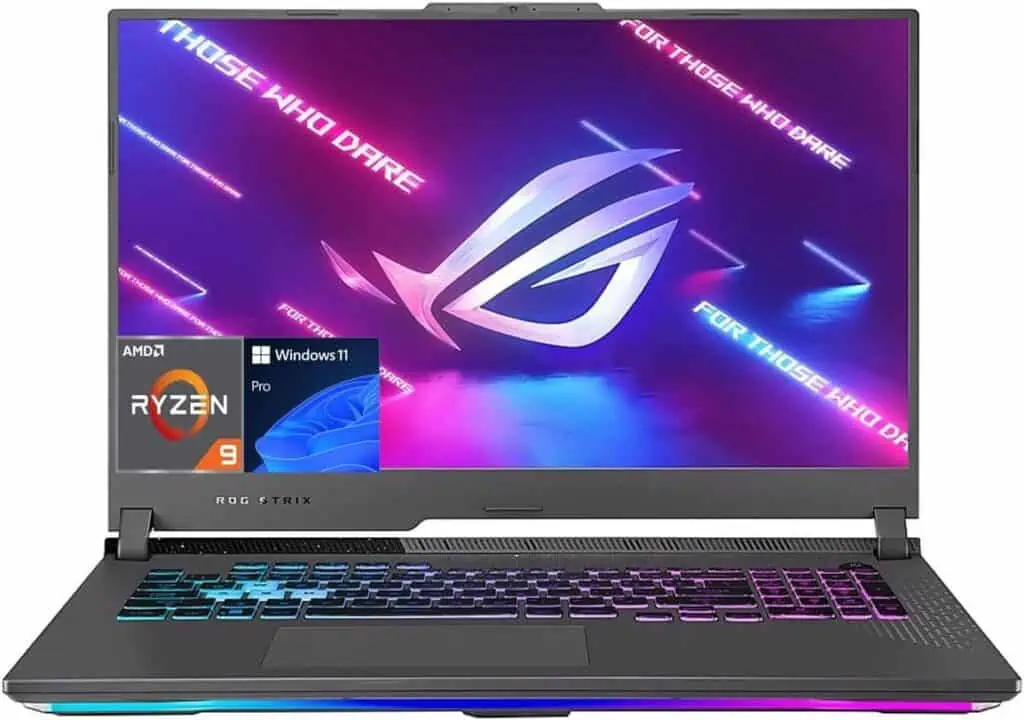
The ASUS ROG Strix G17, primarily a gaming laptop, works wonderfully for data science as well. With a robust AMD Ryzen 9 5900HX processor and NVIDIA GeForce RTX 3080, it can handle multiple data science tasks with ease.
With a large display and high refresh rate, it provides a seamless experience for visualizing data and running heavy data science applications.
Technical Specifications:
- Processor: AMD Ryzen 9 5900HX
- Memory: Up to 32GB DDR4
- Storage: Up to 1TB SSD
- Display: 17.3″ FHD
- Graphics: NVIDIA GeForce RTX 3080
Primarily a gaming laptop, the ASUS ROG Strix G17 works amazingly for data science as well. With a robust AMD Ryzen 9 5900HX processor and NVIDIA GeForce RTX 3080, it can handle heavy machine learning and data analysis tasks.
It has a generous memory and storage capacity, which allows for efficient processing of large data sets. The 17.3″ FHD display is a huge plus for data visualization, and the refresh rate ensures smooth transitions and animations.
6. ASUS VivoBook 15
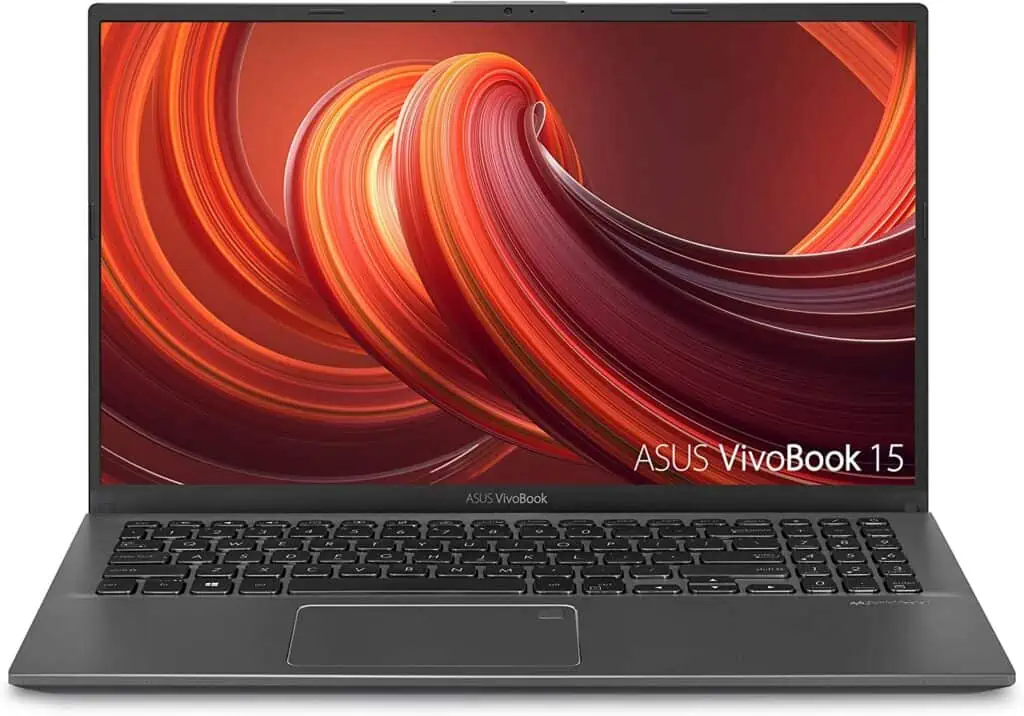
This is a lightweight laptop that offers a good balance between power and portability. It’s an excellent choice for students and data analysts who need a laptop for basic data analysis and learning data science programs.
Technical Specifications:
- Processor: Intel Core i7
- Memory: Up to 16GB DDR4
- Storage: Up to 512GB SSD
- Display: 15.6″ FHD
- Graphics: Intel UHD Graphics
The ASUS VivoBook 15 is a great laptop for students and data analysts. Although it may not have as much power as the other laptops on this list, it still packs a punch with its Intel Core i7 processor and 16GB of RAM.
It’s perfect for basic data analysis and machine learning tasks. The 512GB SSD storage is more than enough for storing various datasets and files. The Intel UHD Graphics allow for smooth data visualization, and the FHD display ensures clear and vibrant images.
7. Prometheus XVII
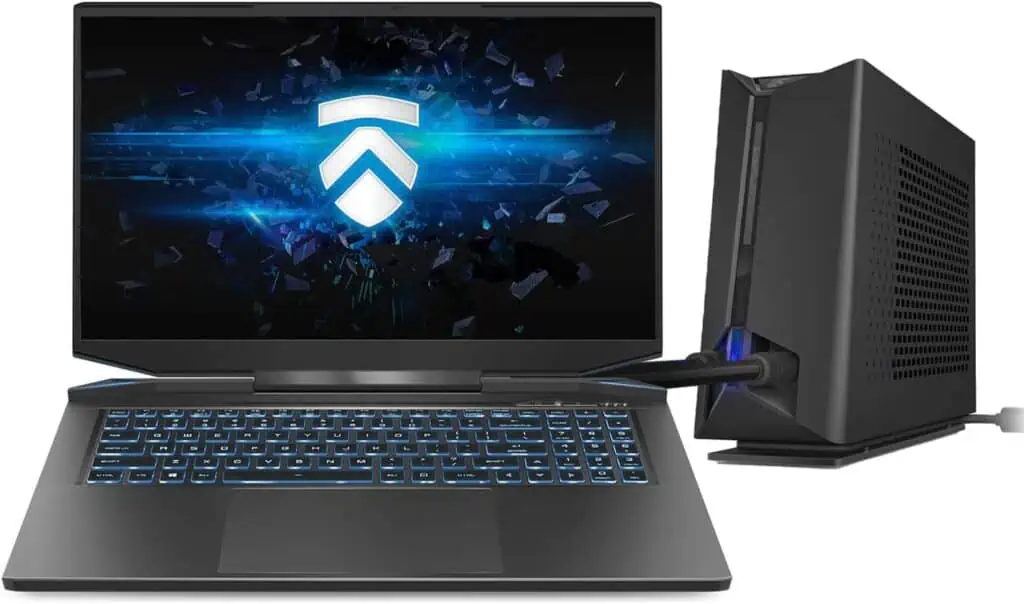
This workstation laptop, while relatively new, offers a powerful processor and graphics card, making it ideal for data science professionals handling big data sets and using deep learning libraries.
Technical Specifications:
- Processor: Intel Core i7-12700H
- Memory: Up to 64GB DDR4
- Storage: Up to 2TB SSD
- Display: 17.3-inch QHD 240Hz Eluktronics
- Graphics: NVIDIA RTX 3060
The Prometheus XVII is a powerful machine that can handle heavy data science tasks. The Intel i7-12700H processor, coupled with the NVIDIA RTX 3060, provides impressive performance when running machine learning algorithms and processing large data sets.
The Prometheus XVII offers extensive storage space and a vast amount of RAM, enabling it to handle intensive tasks and store a large number of files and datasets.
The 17.3″ QHD with 240Hz display provides superb image quality and is great for data visualization tasks.
8. HP EliteBook 845 G8
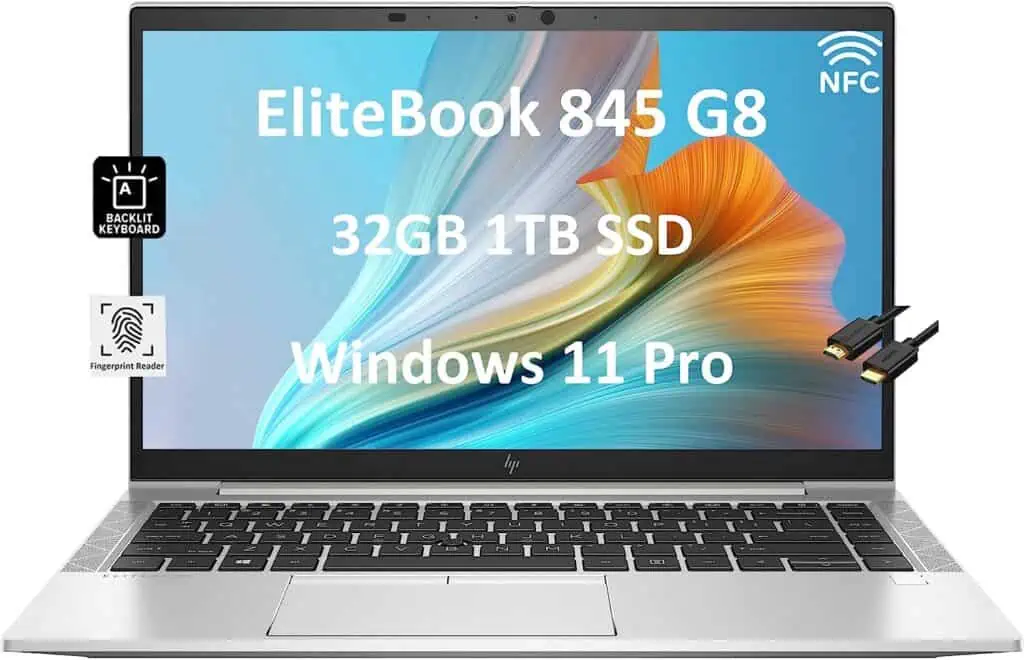
It’s a premium business laptop with excellent specs for data science. Its processing power and RAM make it suitable for handling data analysis tasks.
Technical Specifications:
- Processor: AMD Ryzen 7 PRO 5850U
- Memory: Up to 32GB DDR4
- Storage: Up to 2TB SSD
- Display: 14″ FHD
- Graphics: AMD Radeon Graphics
The HP EliteBook is a solid choice for data science tasks. Its AMD Ryzen 7 PRO processor allows for the efficient running of data analysis software and machine learning tasks.
With its AMD Radeon FHD Graphics, data visualization is a breeze. The FHD display ensures high-quality images, and the ample storage space and generous amount of RAM make this laptop perfect for handling large datasets and multitasking.
9. Dell XPS 13 9310
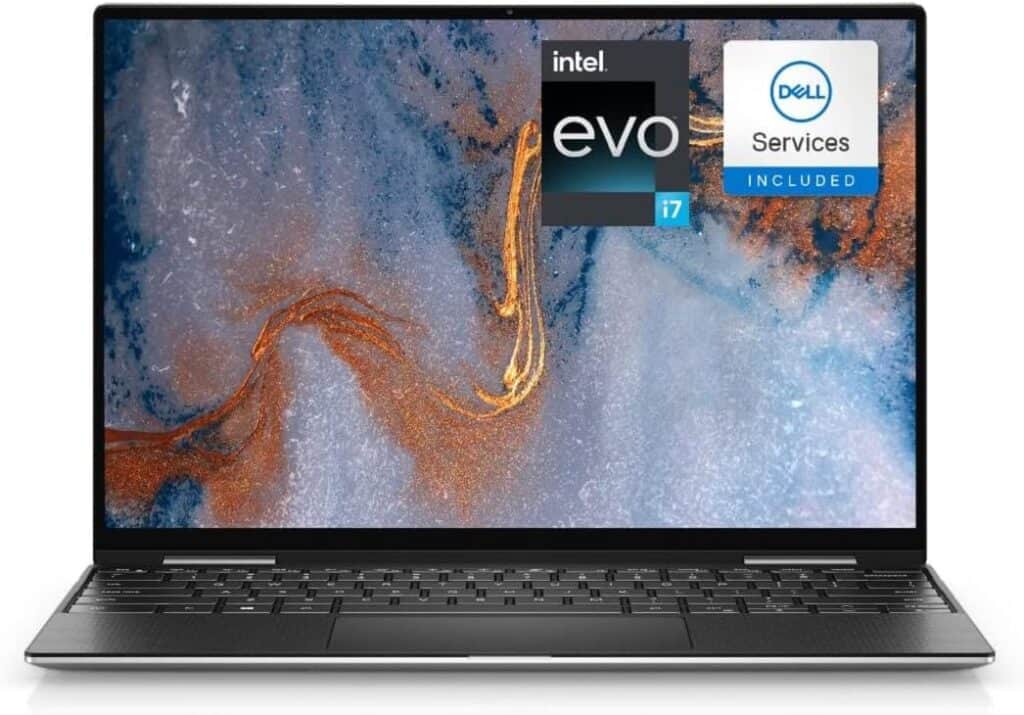
This laptop offers a balance of style, power, and performance. It’s perfect for data scientists looking for a modern laptop that can handle data science.
Technical Specifications:
- Processor: 11th Generation Intel Core i7
- Memory: Up to 32GB DDR4
- Storage: Up to 2TB SSD
- Display: 13.4″ FHD
- Graphics: Intel Iris Xe Graphics
The Dell 9310 XPS offers a balance of style, power, and performance. It is equipped with an 11th-Gen Intel Core i7 processor and Intel Iris Xe Graphics, which provide a smooth experience for running data science applications and visualizing data.
It features a high-resolution 13.4″ FHD display and comes with a massive storage capacity and an ample amount of RAM, making it ideal for storing large data sets and multitasking.
What Makes a Laptop Ideal for Data Science?
The ideal laptop for data science and AI needs to offer the following features: a powerful processor, large storage, a high-quality graphics card, good RAM, and a robust operating system. A laptop that’s designed for gaming can be a good choice for data science tasks due to the high-end specs that allow for efficient processing of large data sets.
The laptop isn’t just a tool; it’s a computer companion for data scientists. An ideal laptop should have the ability to run data science applications smoothly, handle data science projects efficiently, and process large data sets swiftly. It should also offer a comfortable user experience and be sturdy enough to withstand long hours of work.
How to Choose the Best Laptop for Your Data Science Needs
When looking for the best laptop for data science, it’s essential to consider your specific needs and preferences. Are you a data scientist working with complex machine-learning tasks? Or a student who needs a laptop for learning data science and analysis? Your choice of laptop will vary depending on your requirements.
The best data science laptops need to handle tasks like machine learning, deep learning, and data analysis. Therefore, a laptop with a strong GPU, a powerful processor, and sufficient RAM is crucial.
For instance, laptops like the MacBook Pro M2 or the Lenovo ThinkPad T15p are great choices for professionals dealing with heavy data science tasks. On the other hand, if you’re a student, you might find the ASUS VivoBook 15 or Dell 9310 XPS more suitable for learning data science.
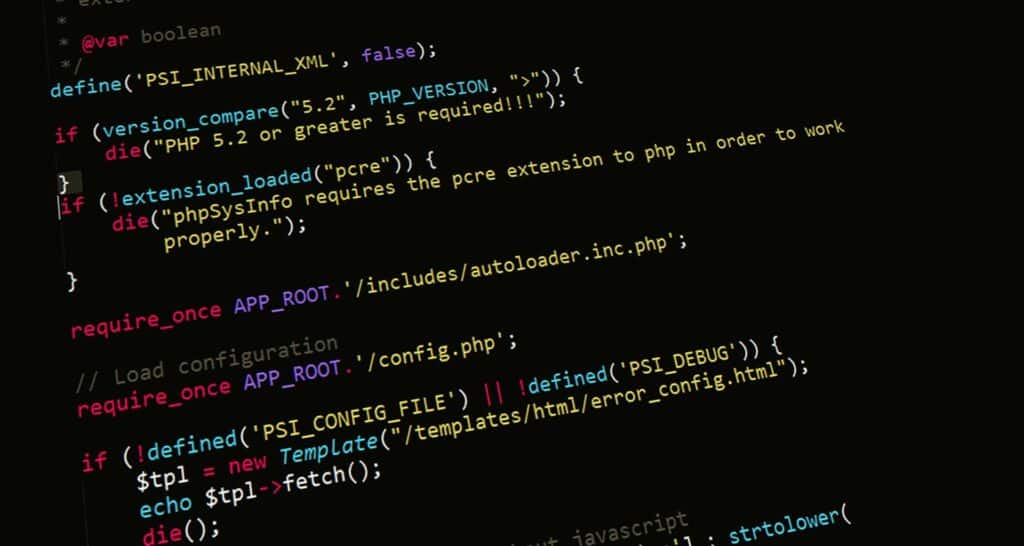
Commonly Used Software for Data Science
Data science is a multidisciplinary field that uses scientific methods, processes, algorithms, and systems to extract knowledge and insights from structured and unstructured data. To support these activities, a variety of software tools have been developed. Here’s a deeper look at some of the most popular ones:
Python
Python is a powerful, high-level programming language used extensively in data science. It’s known for its readability and simplicity, making it a preferred choice for beginners. But don’t let its simplicity fool you; Python is incredibly powerful, mainly due to its extensive array of libraries designed specifically for data science.
These libraries include NumPy for numerical computations, Pandas for data manipulation, Matplotlib for visualization, and Scikit-Learn for machine learning. For deep learning tasks, Python supports TensorFlow, PyTorch, and Keras, among others.
Jupyter Notebook, another Python-based tool, offers a versatile platform for combining text, code, and graphics in a single document for comprehensive data analysis and reporting.
R
R is a language designed specifically for statistical analysis, data visualization, and machine learning. It’s highly extensible and boasts an extensive package ecosystem, with tools such as ggplot2 for visualization, dplyr for data manipulation, and caret for machine learning.
The R Markdown ecosystem enables the integration of code, text, and graphics in a single document, similar to Jupyter Notebook for Python.
SQL
Structured Query Language (SQL) is an essential tool for any data scientist. Most organizations store their data in relational databases, and SQL is the standard language for retrieving and manipulating that data.
Mastery of SQL can significantly enhance a data scientist’s capabilities in handling large datasets.
SAS
SAS (Statistical Analysis System) is a software suite developed for advanced analytics, multivariate analysis, business intelligence, and data management. It’s particularly popular in the enterprise setting due to its robust data handling capabilities and excellent technical support.
Excel
Microsoft Excel, though often overlooked, is a powerful tool in the data scientist’s arsenal. It’s excellent for small-scale data analysis, cleaning and manipulating data, and creating visualizations quickly.
With the addition of Power BI and other advanced tools, Excel can even handle some predictive modeling tasks.
Big Data Tools: Hadoop and Spark
Apache Hadoop is a framework for distributed storage and processing of big data using the MapReduce programming model. Apache Spark, on the other hand, is a fast, in-memory data processing engine built on top of Hadoop.
It excels at iterative computation, making it ideal for machine learning tasks.
Tableau
Tableau is a powerful data visualization tool that enables the creation of interactive and versatile visualizations in the form of dashboards and worksheets.
Tableau is a great tool for business intelligence because professionals at any level in an organization can understand the visualizations created in it.
MATLAB
MATLAB is a high-performance language developed specifically for technical computing. It integrates computation, visualization, and programming in an easy-to-use environment, making it popular for modeling and simulations.
Conclusion
I hope that this guide has provided some clarity on the best laptops for data science available on the market.
The right laptop can significantly improve your data science experience, whether you’re processing large data sets, building complex data models, or simply learning new data science concepts.
Choose wisely, and your new laptop will prove to be a worthy companion in your data science journey!

Frequently Asked Questions (FAQ)
Q: What is the best laptop for data science and AI?
ℹ️ A: The best laptop for data science and AI would be a powerful machine that can handle large datasets and perform complex data analysis tasks. It should have a high-performance processor, a good amount of RAM, and a dedicated graphics card.
Q: Why is it important to use a laptop specifically designed for data science?
ℹ️ A: Data science involves working with large amounts of data and performing computationally intensive tasks. A laptop specifically designed for data science will have the necessary hardware and processing power to handle these requirements efficiently.
Q: What are the key features to look for in a laptop for data science?
ℹ️ A: Some key features to look for in a laptop for data science are a high-performance processor (such as an Intel Core i7 / i9 or AMD Ryzen 7 / 9), at least 16GB of RAM, a dedicated graphics card (such as NVIDIA GeForce or AMD Radeon), and a large storage capacity (preferably SSD).
Q: Can I use a basic laptop for data science?
ℹ️ A: While it is possible to use a basic laptop for data science, it may not provide the necessary performance and capabilities required for advanced data analysis tasks. It is advisable to invest in a laptop with higher specifications for a smoother and more efficient data science workflow.
Q: What is the recommended graphics card for data science?
ℹ️ A: The recommended graphics card for data science is the NVIDIA GeForce RTX series or the AMD Radeon RX series. These graphics cards have the processing power and capabilities to handle complex machine learning and deep learning algorithms.
Q: How much RAM should a data science laptop have?
ℹ️ A: A data science laptop should have at least 16GB of RAM, ideally 32GB. This allows for smoother multitasking and the ability to handle large datasets and perform complex data analysis tasks efficiently.
Q: What storage capacity is recommended for a data science laptop?
ℹ️ A: It is recommended to have a large storage capacity, preferably a solid-state drive (SSD), in a data science laptop. This allows for faster data access and the ability to store and process large datasets.
Q: Which operating system is best for data science?
ℹ️ A: The choice of the operating system for data science largely depends on personal preference. However, popular choices among data scientists are Linux-based operating systems (such as Ubuntu) and macOS, as they offer better compatibility with data science tools and libraries.
Q: How should I choose the perfect laptop for data science?
ℹ️ A: When choosing the perfect laptop for data science, consider factors such as the processor, RAM, graphics card, storage capacity, and the overall performance of the laptop. Also, make sure it meets your specific requirements and budget.
Other Related Articles:







